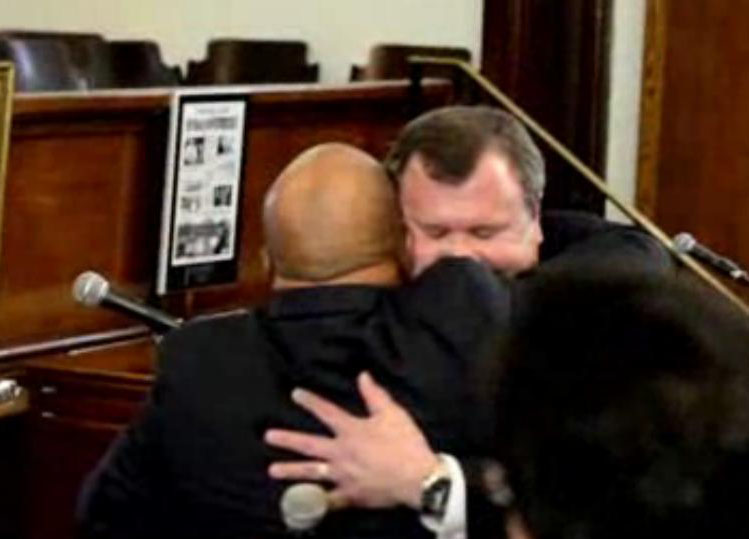
MONTGOMERY, Ala. (BP) — As Montgomery Police Chief Kevin Murphy unpinned his badge from his uniform, only he and the Lord knew what he was about to do. But both of them had known for a long time.
“I had been thinking about it for a while. It had been on my mind and I had thought about it and prayed about it,” Murphy said.
He’d even had some sleepless nights.
But he knew March 2 was “the right opportunity.” He had been asked to speak at a ceremony at historic First Baptist Church on Ripley Street in Montgomery as part of the 13th Congressional Civil Rights Pilgrimage to Alabama. So he did.
But his speech soon became an apology to U.S. Rep. John Lewis on behalf of the Montgomery police department, which stood down while Lewis and other Freedom Riders were beaten by a mob at the local Greyhound station May 20, 1961.
Then, after apologizing, Murphy took off his badge and presented it to Lewis, moving the congressman to tears.
“He [Lewis] was so gracious in his acceptance of it,” Murphy said. “He is a man of great courage. He is my hero. The way he carries himself, he is an inspiration to me and to all of us here.”
Lewis said Murphy was the first chief he knows of in America to apologize, and it “means a great deal.”
Lewis, who was born in Troy, Ala., was beaten several times as he pursued civil rights. He was hit in the head with a wooden crate during the Montgomery skirmish, and Alabama State Troopers beat him on “Bloody Sunday” in Selma on March 7, 1965. He was arrested and jailed more than 40 times in America and four times in South Africa.
But Lewis said his goal was always peace. While studying at American Baptist Theological Seminary in Nashville, he began to study the life of Jesus and the nonviolent tactics of international leaders such as Mahatma Gandhi.
“We all live in the same house. We must care for each other,” Lewis told students and faculty at Judson College in Marion, Ala., on Feb. 21 when the college awarded him an honorary degree.
“We’re all children of the King,” he said. “Never give up. Never become bitter. Keep your faith. Let the Spirit of God Almighty be your guide.”
Because of gestures like Murphy’s, “the healing continues,” Lewis said.
“It moves us toward reconciliation, and that was what the movement was all about,” he said.
Jay Wolf, pastor of First Baptist Church on South Perry Street in Montgomery, said reconciliation has been a matter of collective prayer for black and white pastors for nearly 20 years. A regular gathering of pastors called John 17 finds its goal in Christ’s prayer: “Father, I pray that they would be one so that the world may believe that you sent me.”
“Police Chief Murphy’s apology provides another chapter in the long book of how God is bringing together the body of Christ to facilitate spiritual awakening,” Wolf said. Montgomery is the “cradle of the Civil War and the civil rights movement” but also is filled with “dynamic Christ-followers,” he said. “Montgomery was known for division but it is now known for reconciliation.
“Chief Murphy’s offering of a sincere apology for the injustices suffered by the Freedom Riders and giving John Lewis his badge provides another beautiful portrait of the reality of racial reconciliation,” Wolf said. “I am confident that God wants to send a great revival in our day, but if the Lord’s Church is divided by racial division, then the flow of His life-giving Spirit will be impeded.”
Murphy’s actions “align with God’s call to speak His truth and live His love,” Wolf said.
But Murphy is quick to say he’s no hero.
“It was a very easy decision to make, because it was the right thing to do,” he said. “I really feel like God directed me … I think that somebody who is wearing this uniform with this iconic patch that you see in the photographs of Martin Luther King [Jr.] and Rosa Parks, that that voice needs to be heard in a different light from what history has recorded in years past.”
It was a very personal decision, he said. “I didn’t want any attention. I didn’t even talk to my own wife about it.”
When Murphy got home from the ceremony, his wife Debbie asked him how it went, and he only told her it was “an outstanding and beautiful service.” A few hours later, after she got a phone call, she sought him out on the other side of the house and asked, “Is there something you want to tell me?”
In doing what he did, Murphy “pleased the King and built the Kingdom,” Wolf said.
–30–
Grace Thornton is assistant editor of The Alabama Baptist
(www.thealabamabaptist.org), newsjournal of the Alabama Baptist Convention, where this story first appeared.
















